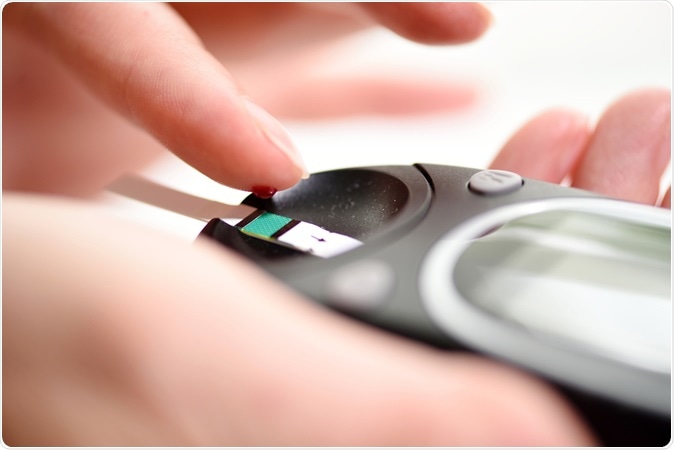Around 1.25 million Americans are living with type 1 diabetes and 40,000 new cases are detected each year. In this condition body’s own immune system attacks and damages the insulin-producing β-cells inside the pancreas leading to impaired glucose metabolism in the body. There is no other treatment for this condition than regular painful insulin injections to maintain the normal insulin levels in the body. Type 1 diabetes is currently considered to be incurable.

Diabetes patient measuring glucose level blood test use glucometer and small drop of blood from finger and test strips. Image Credit: Harisn / Shutterstock
In a landmark study, researchers compared immunotherapy based treatment for type 1 diabetes with placebo and showed that the novel immune treatment can stop the progression of type 1 diabetes. The immune therapy was also deemed safe among subjects. The study was published in the journal Science Translational Medicine.
Mohammad Alhadj Ali and colleagues for this study included 27 people who were within 100 days of being diagnosed with type 1 diabetes and randomly divided them into two groups - to receive injections of either placebo or immunotherapy at two or four week intervals for six months. The new immune therapy they have developed is made to distract the T cells of the immune system that normally destroy the beta cells of the pancreas. It works by mimicking a portion of proinsulin peptide. Thus the immune cells attack this imposter and leave the insulin secreted intact. The injected drug also trains the T cells to recognize them as harmless so that they do not attack the beta cells that make proinsulin in the body.
Therapy showed no toxic side effects and the progression of beta cell destruction was prevented to a great extent with this therapy not only during the trial but also six months beyond that. All eight subjects who received the placebo injection needed to increase their insulin doses over the year of follow up whereas individuals receiving the new treatment all remained stable. The study needs larger clinical trials for longer to prove its effectiveness and safety but this is an encouraging start write the authors.
Mark Peakman from King’s College London, who worked on the project said a new drug could be available in the market for use by type 1 diabetics in five to 10 years, “if everything goes well”.
Type 1 diabetes
There are two main types of diabetes;
- Type 1 diabetes mellitus describes a condition where the body cannot produce insulin which leads to a very high level of blood sugar and associated complications.
- Type 2 where the pancreas does not produce enough insulin or if the body’s cells do not respond adequately to the insulin produced.
About 10% of all diabetes is type 1. Type 1 diabetes can develop at any age, but usually appears before the age of 40. Most cases are detected in childhood so it is sometimes called juvenile diabetes or early onset diabetes.
In type 1 diabetes, the pancreas fails to produce adequate amounts of insulin, the hormone that regulates blood sugar levels and helps the body utilize sugar. Individuals with type 1 diabetes are therefore dependent on insulin injections for their blood sugar to be regulated.
There are three main symptoms of diabetes which include;
- polydipsia (increased thirst)
- polyphagia (increased hunger)
- polyuria (increased frequency of urination)
In addition, patients may complain of fatigue, weight loss and loss of muscle bulk. Type 1 diabetes can develop very quickly, over weeks or even days.
Diagnosis involves the assessment of blood sugar and insulin levels and treatment is aimed at maintaining blood sugar at an around normal level. If left untreated, type 1 diabetes can lead to several complications such as diabetic nephropathy (kidney disease), diabetic retinopathy (damage to the retina of the eye) and neuropathy (nerve damage). Since type 1 diabetes is caused due to a lack of insulin, insulin injections are to be used once or more everyday to normalize the blood sugar level.
References